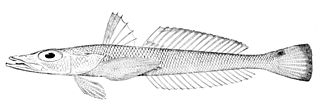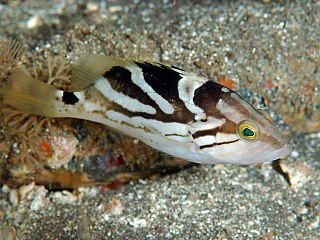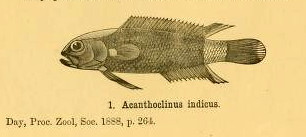
The Percidae are a family of ray-finned fish, part of the order Perciformes, which are found in fresh and brackish waters of the Northern Hemisphere. The majority are Nearctic, but there are also Palearctic species. The family contains more than 200 species in 11 genera. The perches, and their relatives are in this family; well-known species include the walleye, sauger, ruffe, and three species of perch. However, small fish known as darters are also a part of this family.

Epinephelus is a genus of marine ray-finned fish, groupers from the subfamily Epinephelinae, part of the family Serranidae, which also includes the anthias and sea basses. They are predatory fish, largely associated with reefs and are found in tropical and subtropical seas throughout the world. They are important target species for fisheries.

The Old World silversides are a family, Atherinidae, of fish in the order Atheriniformes. They occur worldwide in tropical and temperate waters. About two-thirds of the species are marine, and the remainder live in fresh water. The 74 species are in 13 genera. The genus Craterocephalus is the most diverse with 25 species. Four genera are monotypic.

The longfins, also known as roundheads or spiny basslets, are a family, Plesiopidae, which were formerly placed in the order Perciformes but are now regarded as being incertae sedis in the subseries Ovalentaria in the clade Percomorpha. They are elongated fishes, found in the Indian Ocean and western Pacific Ocean.

The Percophidae, duckbills, are a family of percomorph fishes, from the order Trachiniformes, found in tropical and subtropical waters of the Atlantic and Indian Oceans and in the southwestern and southeastern Pacific.

The stream catfishes comprise the family Akysidae of catfishes.

The comet grouper, also known as the comet cod or dot-dash grouper, is a species of marine ray-finned fish, a grouper from the subfamily Epinephelinae which is part of the family Serranidae, which also includes the anthias and sea basses. It is a species of deep coral reefs in the Indo-Pacific region.

The snowy grouper is a species of marine ray-finned fish, a grouper from the subfamily Epinephelinae which is part of the family Serranidae, which also includes the anthias and sea basses. It is found in the western Atlantic Ocean.

The Microcanthinae, commonly known as footballers, mados, stripeys, and moonlighters, are a subfamily of the sea chubs, a family of marine ray-finned fish in the order Perciformes.

Variola, the lyretails, is a genus of marine ray-finned fish, groupers from the subfamily Epinephelinae, part of the family Serranidae, which also includes the anthias and sea basses. They are found in the tropical Indo-Pacific and their distribution extends from the Red Sea to South Africa across the Indian Ocean and east to the islands of the central Pacific.

Cephalopholis panamensis, the Pacific graysby or Panama graysby, is a species of marine ray-finned fish, a grouper from the subfamily Epinephelinae which is in the family Serranidae which also includes the anthias and sea basses. It is found in the Eastern Pacific Ocean.
Atherion is a small genus of silversides, known as the pricklenose silversides. It is the only genus in the family Atherionidae. Other authorities classify this as a monogeneric subfamily, Atherioninae, of the Atherinidae, while others include it within the subfamily Atherinomorinae. They have an Indo-Pacific distribution.

Caprodon is a small genus of fish belonging to the subfamily Anthiinae. It contains three species.

Lepidoperca is a small genus of fish belonging to the Anthiinae subfamily. It includes ten species.

Branchiostegus is a genus of marine ray-finned fishes, tilefishes belonging to the family Malacanthidae. They are found in the eastern Atlantic Ocean through the Indian Ocean to the western Pacific Ocean. Here they create burrows in soft substrates in the comparatively deep waters of the continental shelf and slope.

The Acanthoclininae is a subfamily of ray-finned fishes, one of two in the family Plesiopidae. They are characterised by the head being scaleless or nearly scaleless, a dorsal fin which has 17–26 spines and 2–6 soft rays, an anal fin having 7–16 spines and 2–6 soft rays while the pelvic fin has one spine and two soft rays. There are between one and four lateral lines, the number of vertebrae is between 26 and 35. They grow to a maximum length about 30 centimetres (12 in).

Congrogadinae is a subfamily of ray-finned fishes, one of four subfamilies that make up the family Pseudochromidae, these elongated fish are commonly called eel-blennies.
Pseudoplesiopinae is a subfamily of the family Pseudochromidae, the dottybacks, it consists of small species of coral-reef inhabiting fish which are distributed throughout the Indo-Pacific.

The Spanish flag is a species of marine ray-finned fish, a grouper from the subfamily Epinephelinae which is part of the family Serranidae, which also includes the anthias and sea basses. It is found in the western Atlantic Ocean. It is the only species in the genus Gonioplectrus.

The Serraninae is a subfamily of perciform ray-finned fishes in the family Serranidae. It is made up of ten genera and 87 species.



















